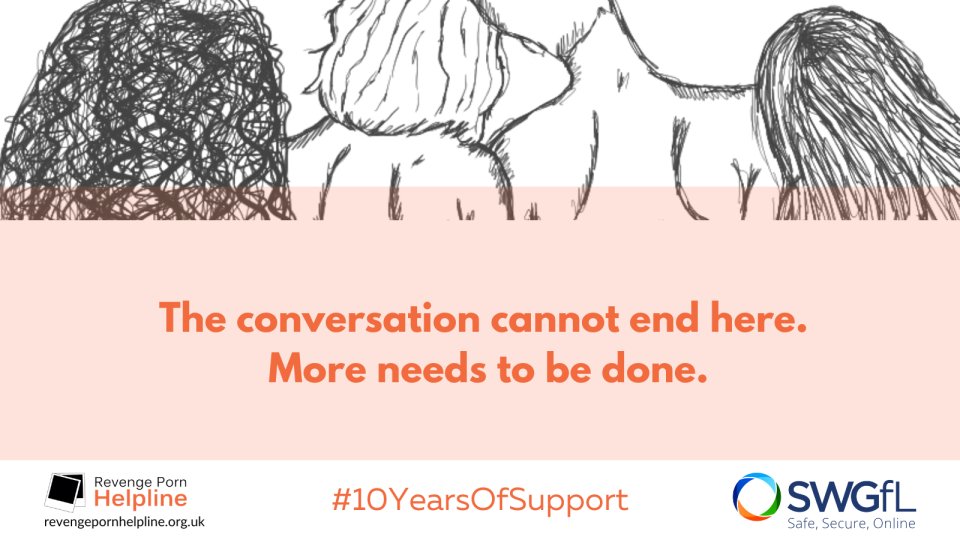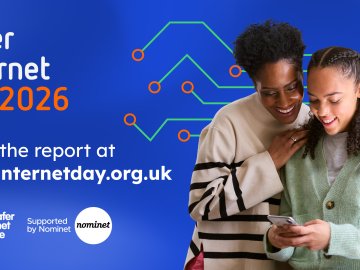2025 marks a significant milestone: ten years of the Revenge Porn Helpline. It’s not only been a decade since we started a new service to support anyone over the age of 18 affected by intimate image abuse,but it is also the anniversary of when the first legislation was announced that made the sharing of someone’s intimate images without consent an offence in England and Wales.
When we started in 2015, we had one part-time member of staff hired to handle the small level of reports that were coming in. It was a problem that not many people were aware of, and a helpline service commissioned to support those who were being victimised was a move that many people weren’t convinced would work. Now, when I look across the office and see our growing team of committed individuals handle the endless stream of reports that come in via phone and email every single day, I reflect on just how far we have actually come.
10 Years of Support
When we started planning the campaign for the 10-year anniversary, we had some goals in mind: raise awareness of the Revenge Porn Helpline’s impact, highlight the current legislative landscape around intimate image abuse and most importantly, advocate for change. We have come a long way since 2015, and I am pleased to say that intimate image abuse is finally being taken seriously. We have had new laws come into effect including the much-anticipated Online Safety Act that provides more protection for those who have been affected whilst outlining considerable consequences for those who commit this harm.
Although we have come a long way, there is still so much more to do. We are continually reminded that there are still gaps where harm occurs that need to be addressed. Non-consensual intimate imagery (NCII) is still not being treated seriously enough. We are at a stage where the behaviour is being criminalised, but the actual content can remain available legally. This means that someone can go to jail for committing an act of intimate image abuse but the material they used to commit their crime can remain legally accessible online. It’s a baffling legal landscape that somehow allows abuse to continue even after a conviction.
Treat NCII in the Same Way as CSAM
To tackle this issue, we are advocating for NCII to be treated in the same way as child sexual abuse material. This change would address criminalising the possession and sharing of confirmed NCII content. Although it would not resolve all issues, it would go a long way towards extending protections for victims. Our call for action was supported by the Women’s and Equalities Committee in their recent report on tackling NCII
"For internet infrastructure providers to take this threat seriously and block access to websites that refuse to comply, NCII should be brought in line with child sexual abuse material (CSAM) in law."
This push for impactful change has also been significantly amplified through various media outlets, with the BBC, the Guardian and ITV, all running coverage about why this change needs to be made.
Remove NCII Content from Perpetrator Devices
Another considerable gap that became apparent in recent years was the fact that perpetrators were being allowed to keep NCII content on their devices even after a conviction. For victims, it’s more than just a legal loophole that being exploited, it is a systemic failure. The knowledge that an abuser still possesses their images, with the potential for them to be reshared at any moment, is a source of ongoing trauma and one that completely removes any sense of protection a victim may feel they have after a successful conviction.
This is not just a failing of the courts but also of prosecution practices. If the Crown Prosecution Service (CPS) does not routinely request the deprivation orders that exist, then magistrates and judges are unlikely to impose them. The result is a legal system that unwittingly enables perpetrators to continue exerting control and psychological abuse long after sentencing.
To open the discussion around this, we worked closely with the Observer to reveal an alarming inconsistency in the use of deprivation orders (the legal mechanism by which courts can delete intimate images from perpetrator devices). Despite the clear powers that are available under the Sentencing Act 2020, only three out of 98 cases in the last six months had resulted in such an order.
Raising this awareness, led to the Crown Prosecution Service acknowledging this gap and updating their guidance to advise prosecutors to prioritise deprivation orders early in case strategy. We hope this guidance will lead to more consistent enforcement of device confiscations post-conviction, ensuring perpetrators are stripped of their means to continue causing harming to victims.
A Global Call to Action in Tackling NCII
Since the start of the year, we have been raising awareness of the significant harm that NCII causes around the world. To reinforce our efforts to achieve meaningful change, we have hosted a number of high-profile events to understand the scale and implications of NCII.
The NCII Summit in New York, held during the UN Commission on the Status of Women (UNCSW), convened key stakeholders from technology, policy and advocacy sectors to address the issue. The Summit underscored the growing recognition of NCII as a severe and under-reported form of abuse whilst facilitating essential conversations about technological solutions, evolving regulation, and the increasing number of platforms committing towards integrating safety measures.
We were delighted to have contributions from a diverse range of global experts and policymakers from Microsoft, UNODC, UK Women and Equalities Committee, and GREVIO. Tech industry leaders from Meta, TikTok, and Microsoft shared their latest approaches to combating NCII, alongside leading NGOs such as CCRI (USA), WESNET (Australia), ONG Amaranta (Chile), and of course our very own Revenge Porn Helpline.
A significant moment was Senator Ted Cruz's video address, acknowledging the severity of NCII and the global efforts needed to protect individuals online. It was an impactful event that showcased the ongoing efforts to tackle NCII, with calls for more awareness and protections to be implemented on a global scale.
The Busiest Year on Record
To bring the campaign to a close, we released the latest annual report from the Helpline, representing the latest reporting data from 2024. Unsurprisingly, it was marked as our busiest year on record, with a 20.9% increase compared to 2023 and a total of 22,275 reports coming through to the helpline. It reinforced where we are within the current digital landscape: intimate image abuse is not going away, but more people are calling for support.
Final Reflections
As we near the end of the 10-year anniversary campaign, I can feel change coming. Recognition of the harms of intimate image abuse, and the support that is needed for victims, is at an all-time high. We will not eradicate this abuse for good, but we can hope that lasting and impactful change is coming: in law, in public perception and in resources. Until that time, the Revenge Porn Helpline will continue to support anyone over the age of 18 who has been affected by intimate image abuse.






